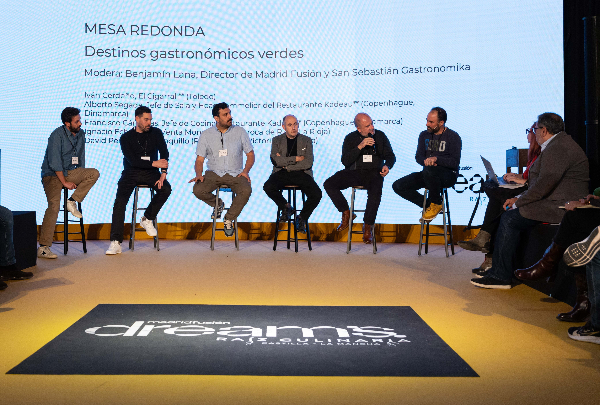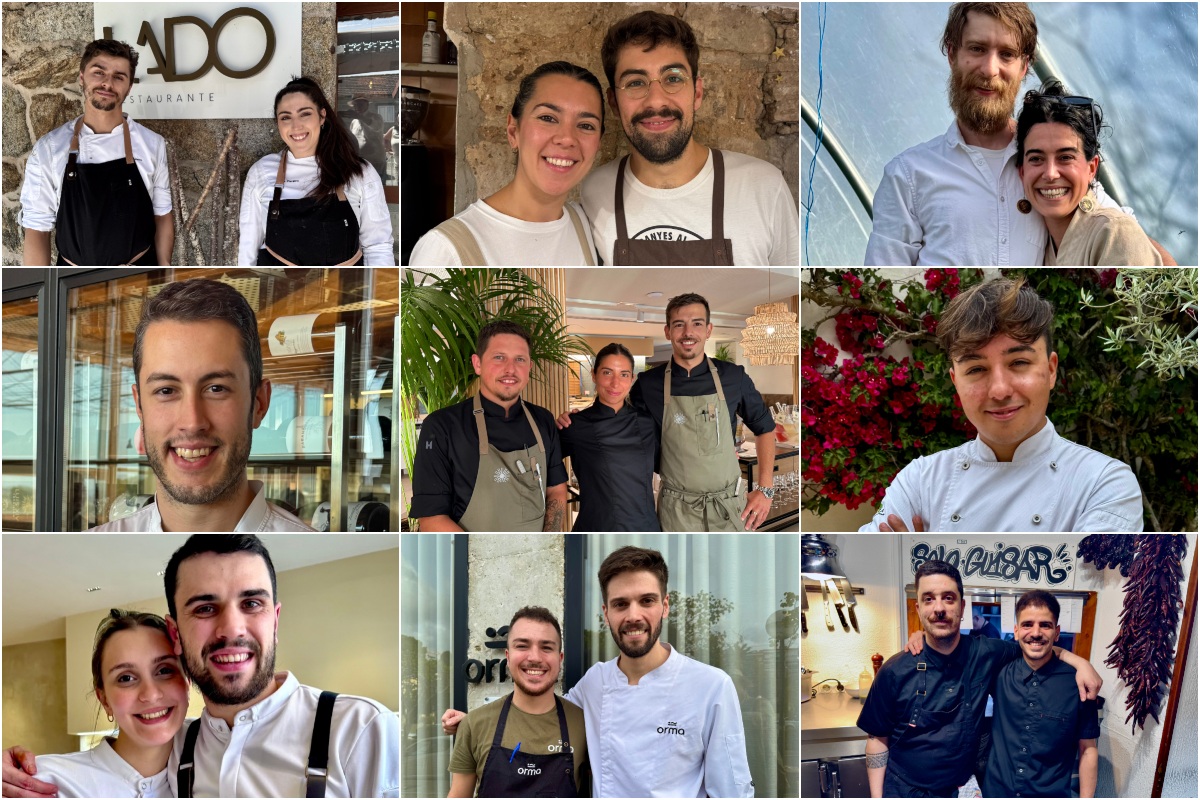News
Dreams Raíz Culinaria demonstrates how science and technology can increase gastronomic efficiency and creativity.

Innovation in agriculture, with the use of AI, drones and satellites, and the importance of technology to the farmer were also part of the content of this congress.
What is the future of food and gastronomic areas? It was under these premises that the most successful proposal of the last edition of Madrid Fusión 2024 made its solo debut in Toledo, thanks to an agile and interactive format. Madrid Fusión Dreams Raíz Culinaria was held at the Círculo del Arte, in the old church of San Vicente, in the capital of Castilla-La Mancha, and was open to multiple debates. The setting, conceived as a "comedy corral", encouraged "the dialogue that does not take place in large congresses", as Benjamín Lana, director of Madrid Fusión and San Sebastián Gastronomika, pointed out. And this in a city that, like the rest of Castilla-La Mancha, is committed to gastronomy as a "strategic pillar", according to Ana Isabel Fernández, Director General of Tourism, Commerce and Handicrafts for the regional government.
Here, in the face of widespread globalisation in all sectors, the local has been defended. Like Javier Sanz, from Oba* (Casas Ibáñez, Albacete), whose grandfather opened a bar in the village and whose speciality was the fried birds his family used to hunt. It was very rooted in the area, we cooked what we had, we didn't bring anything from outside,' he explains. Both he and his partner, Juan Sahuquillo, grew up with "the territory in their veins" and although they are now imbued with foreign techniques, they have not lost that essence. For them, product limitations are 'small windows for creativity'. Sanz made an appeal: 'Don't forget tradition and local culture'.
Xosé Cannas, from Pepe Vieira** in Raxó (Pontevedra), does not forget his roots either, and how his grandfather left him and his brother a million pesetas each, which allowed them to open the restaurant where they defended creativity in Galician territory, deeply rooted in the pure and simple product. They defended themselves with their creative concept, closely linked to the territory, which they still maintain today. We play with our culture and our heritage," he explains.
The Echapresto brothers, Ignacio (chef) and Carlos (sommelier), who run Venta Moncalvillo** (Daroca de Rioja), defend "authenticity and local products". We are the main agents for the visibility of local ingredients such as pamplinas or pimpinelas, and this is what makes us unique," says Ignacio in Dreams. That is why they have created a vegetable garden with more than 150 varieties of vegetables.
David Pérez, from the Ronquillo restaurant in Ramales de la Victoria (Cantabria), highlighted the gap between the legislative world and the rural world. Having grown up in a village bar run by his family with "local drunks", he has managed to turn it into a gastronomic space where "traditional" Cantabrian cuisine and stews are triumphant, both for an initially reluctant local public and for visitors from other cities.
Iván Cerdeño, of El Cigarral del Ángel (Toledo), is also defending the local culinary heritage with his own personal touch. We have an obligation to our land and to ourselves; I can't cook prawns here, and is turbot or pine nuts a better product? It depends on where we are', he defended.
At Kadeau** (Copenhagen), Alberto Segade, head waiter and sommelier, and Francisco Cárdenas, head chef, serve an almost entirely foreign clientele, but according to the rules of the new Nordic cuisine, based entirely on local produce. A gastronomy that, with institutional support, has become the focus of tourism, which has also given rise to 'an explosion of patisseries, wine bars and restaurants that are not haute cuisine'. Of course, 'the moment you leave Copenhagen, it's a disaster'.
There was also room for enogastronomy, which is on the rise, as representatives of Abadía Retuerta (Sardón del Duero, Valladolid), Bodega Pago del Vicario (Porzuna, Ciudad Real) and Bodegas Casal de Armán (O Cotiño, San Andrés Ribadavia, Ourense) demonstrated, whose culinary commitment has increased visits to their premises and knowledge of their wines.
Efficiency in restaurants
David Chamorro, director of the Food Idea Lab, provided the innovative touch and essential help to make restaurants more efficient, both in terms of reducing cooking times and energy consumption, without sacrificing flavour. We are terribly inefficient," he said at the start of his presentation, which showed how to make an express stock using citric acid and bicarbonate to pre-treat meat, how to add pectinase to reduce the cooking time of vegetables and preserve their flavour, and how to use bentonite (widely used in the world of wine and beer) to clarify stocks.
More science
The Fundació Alícia, which has collaborated on the content of this Culinary Root Dreams, as in Madrid Fusion, was represented by its director, Toni Massanés, who explained how the five senses work and the cultural influence on gastronomy. Likewise, Gabriel Bartra, Content Director of Bullipedia (elBullifoundation) and Sapiens Training Coordinator at the Madrid Culinary Campus - the centre promoted by the Universidad Pontificia de Comillas and Vocento that offers comprehensive training in gastronomy, business and agronomy - together with Pablo Márquez, Gastronomy Director at MACC, explained how elBulli works during its creative phase, when it is closed to the public and preparing for the new season.
This is how the Sapiens methodology was born, to gain in-depth knowledge of products and techniques, which has been translated into books through the subsequent work of the elBulliFoundation and laBullipedia. The aim: to understand the product in order to treat it as well as possible and to create dishes.
Of cheese and drones
Nuria María Arribas, director of InLac, the Spanish dairy industry association, revealed that Spain lags far behind the European average in cheese consumption per capita - around 9 kilos compared to 21 - and nutritionist Lucía Alonso spoke about the importance of improving eating habits with professional help.
Innovation in agriculture also had its place at this congress, which discussed drought, pests and how to avoid them, traceability, satellites, drones and AI, with a clear conclusion: 'Farmers who do not use technology will disappear'.
Farmers in 5 years' time will be different," said Juan Francisco Delgado, Vice President of the European Foundation for Innovation. There will be more women in the field, more intelligence, sustainability, efficiency. He also pointed out that technology is closing the gap with downstream industries, marking the beginning of the 'white coat revolution'.


